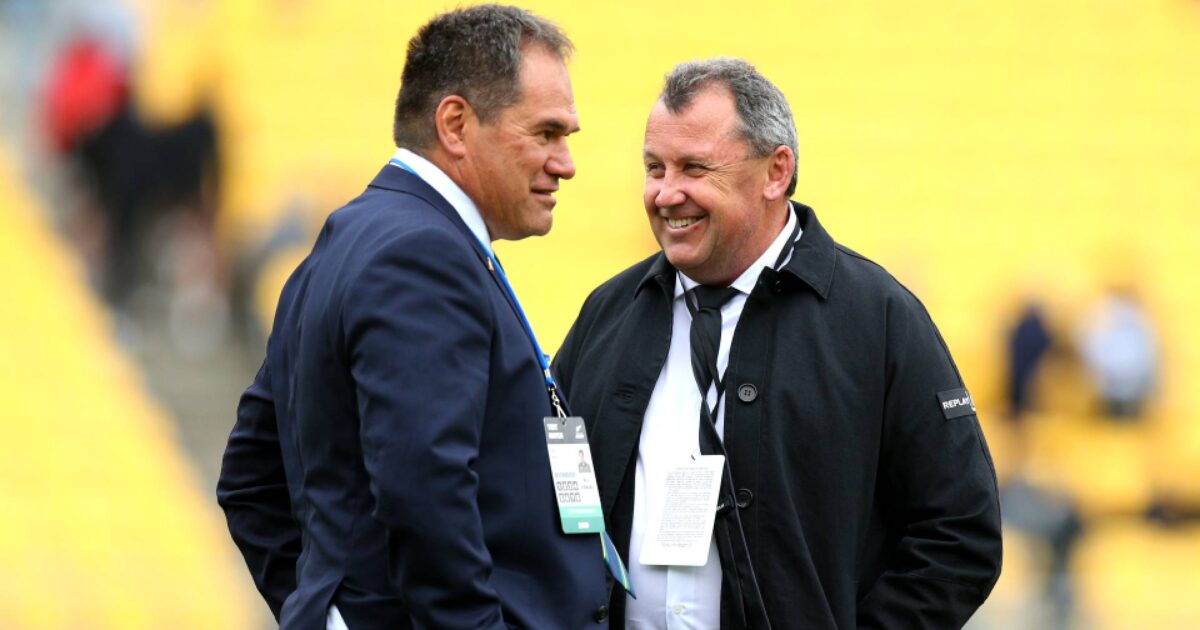Ian Foster and Dave Rennie take opposing views on missed drop goal opportunities

One of the biggest talking points around the drawn Bledisloe Cup test on Sunday was the decision of both the All Blacks and Wallabies not to attempt a drop goal late in the match.
Had either side tried to score a three-pointer at any point throughout the nine-minute-long injury time period, we may be talking about a win to one of the two teams instead of the 16-all draw that opened the four-match series in Wellington.
Instead, both the All Blacks and Wallabies spurned chances to take a shot at the posts from handy positions after the full-time whistle, and the coaches of both sides have offered differing viewpoints on what could have been a winning moment.
Despite his side’s insistence on driving the ball towards the line with the forwards, All Blacks head coach Ian Foster backed his team’s decision to keep the ball in hand.
Speaking to media after the game, Foster said there was plenty of deliberation among his coaching staff about what the best option was late in the match.
Despite being parked up right in front of the Australian posts, the All Blacks persisted with carrying the ball through their forwards, with one attempt to go wide fizzling out due to a sloppy pass by TJ Perenara which forced Jordie Barrett to the ground.
Foster believed that was the right option to take, but said the lack of skill execution prevented his side from capitalising on the opportunity that had been handed to them.
“We had a number of opinions in the [coaches] box, but no, we were well set-up,” he said.
“I thought we’d calmed ourselves down, we were well set-up under the goalposts for a drop kick, and I think you’ll see Richie was hovering around in that position.
“But Jordie called the ball, and it was actually a pretty solid decision because George Bridge was pretty well unmarked.
“That’s skill execution, we couldn’t get the ball out where it needed to be. That hurts, but it’s a message to us all that test rugby is back, and if you’re not good enough in those big moments, then you don’t get what you want.”
He might have impressed off the bench in his test debut, but Caleb Clarke was left with his heart in his mouth following an injury time error.https://t.co/rWcMluiXDd
— RugbyPass (@RugbyPass) October 12, 2020
While Foster defended his players’ decision, Wallabies boss Dave Rennie took a more blunt approach, labelling his side’s inability to line up a shot at goal as an “opportunity lost”.
Moments before the All Blacks threatened to steal the match deep into injury time, Australia had a chance of their own to clinch their first victory against the hosts on New Zealand soil in 19 years.
An 83rd minute penalty attempt by Reece Hodge from inside his own half clanged against the upright, but a spillage from the rebound by Caleb Clarke allowed the Wallabies to retain possession and push for a winning score.
Similarly positioned to the All Blacks at the opposite end of the field, the visitors could have sealed an unheralded victory with a drop goal from a favourable spot on the park, but an Ardie Savea turnover was enough to save the All Blacks on their own tryline.
Rennie revealed post-match that his side had practised for a drop goal scenario in the week leading into the test, but suggested a lapse in communication might have been the reason behind the attempt that never came to fruition.
“We practised it during the week. James O’Connor dropped back in the boot, not sure what happened there around communication, but we ended up going a little bit wider than that and turned it over,” he said.
“Opportunity lost, obviously.”
From a missed chance to take a drop goal to Rieko Ioane's mishap, there was plenty to digest from Bledisloe Cup I. #BledisloeCup #NZLvAUS https://t.co/Ga4vesX6Tj
— RugbyPass (@RugbyPass) October 11, 2020
Speaking to media on Monday, All Blacks first-five Richie Mo’unga, who was on the field in the dying stages of the game, admitted the idea of taking a shot at goal was there
“Yeah, they sure did,” he said when asked if the thought of taking a drop goal had “come into the picture”.
“There was a couple of times when I dropped into the pocket, but momentum had us and we looked likely to score, so drop kick wasn’t in the question as we were going forward.
“Had Jordie got the pass, or had we got the pass away, we wouldn’t really be talking about drop kicks, but [it] definitely was in my mind, but I felt like we were going forward and could have scored.”











































